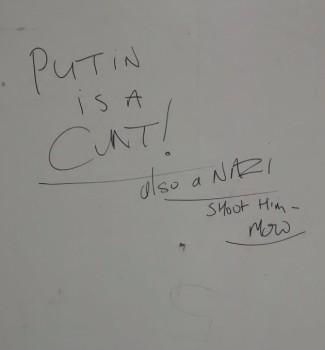We are developing the social individualist meta-context for the future. From the very serious to the extremely frivolous... lets see what is on the mind of the Samizdata people.
Samizdata, derived from Samizdat /n. - a system of clandestine publication of banned literature in the USSR [Russ.,= self-publishing house]
|
“Charges dropped against Spurs fans’ Yid chants”, reports the Tottenham and Wood Green Journal.
About bloody time. The charges were more than usually malicious and absurd. The usual level of malice and absurdity is to pretend that certain syllables – called “racial insults” among the illuminati – are magic spells infused with the irresistible power to turn any mortal that hears them into a raging savage. It was the rare achievement of these charges to be crazier, nastier and more insulting to the intelligence and decency of ordinary people even than that.
As reported by the Jewish Chronicle, although by shamefully few of the other reports of the case, the men charged had said “Yid” not as an insult but as a way to cheer on their own team. All three men are Tottenham Hotspur supporters. They may be Jews themselves; I could not find a source that stated whether any of them are or not, but given that they are Spurs fans it could well be the case. I found an interesting article in Der Spiegel (no need to say the obvious) that gave a brief but clear explanation of this phenomenon:
Tottenham Hotspur’s Jewish background is similar to the Ajax [a Dutch football team] story. The north London club was popular among Jewish immigrants who settled in the East End in the late 19th and early 20th centuries. “The Spurs were more glamorous back then than the closer West Ham United or Arsenal,” says Anthony Clavane, a Jewish journalist with the tabloid Daily Mirror who published a book in August about how Jews have influenced the history of English football. Additionally, other northern London districts, such as Barnet, Hackney and Harrow, have traditionally been home to many Jews, which has also contributed to the Hotspur image.
So, for historical reasons the Tottenham Hotspur home stands sing of their own as the Yids, the Yiddos, or the Yid Army. For this it was proposed to put three men in jail. From the Jewish Chronicle link above,
Their arrests followed widespread debate late last year, after the Football Association issued guidelines in September announcing that fans chanting the word “Yid” could be liable to criminal prosecution.
The move caused anger among Spurs fans, who refer to themselves as the “Yid army” as well as the Tottenham Hotspur Supporters Trust, which stressed that “when used in a footballing context by Tottenham supporters, there is no intent or desire to offend any member of the Jewish community” .
Following the example set by everyone from the Desert Rats to Niggaz Wit Attitude they have taken what was once an insult and turned it into a badge of honour. Tasteless? Possibly. Knowing nothing of the history of a Jewish link to Tottenham Hotspur FC, I recall once being shocked to see a blackboard outside a pub advertising a forthcoming match to be televised there as a contest between the “Yids” and whatever team were to oppose them. I mumbled an attempt at protest to a barmaid who had stepped outside for a fag. She didn’t know what I was talking about – in retrospect I’m not sure she even understood that “Yids” had any other meaning than a nickname for THFC – and I slunk off in embarrassment. One could certainly argue that it it is a poor memorial to the persecution and mass murder suffered by Jews over the centuries to make an insult used against them into a means to excite collective euphoria among people watching a game. But if you really want to contemplate great barbarities memorialised in plastic, turn your eyes to the attempts of the Crown Prosecution Service to charge Gary Whybrow, Sam Parsons, and Peter Ditchman with racial abuse, and smear them as anti-semites, for asserting the Jewish identity of their own team.
I don’t care for how many Ukranians say ‘Ukraine’, if any of them think we should say ‘Ukraine’, they can swivel, as in English, it is and has been, ‘The Ukraine’.
– Samizdata commenter Mr. Ed.
If Russian govt. endorses Crimean referendum, will they also allow/endorse similar votes in republics in Russian Federation?
– Michael McFaul, former US ambassador to Russia
I attended Dominic Frisby’s talk at Brian’s, and Brian asked me to write about what I learned.
The talk did not get far into the technicalities of Bitcoin, which was good for me as I already think I know most of it. Until recently I knew some of it, and two articles by Ken Shirriff completed that picture.
But Dominic is not the quiet, contemplative, theoretical person that I am. When he wants to find something out, he goes out and talks to people. This means he has lots of stories. And so I learnt of his experiences attending a Bitcoin auction under a marquee in a London back-street (the most culturally diverse gathering he has ever attended), talking to wealthy Bitcoin owners who live in squats and are part of the Occupy movement, and exploring the myriad Darknet marketplaces that have sprung up after the demise of Silk Road. He compared Bitcoin now to Rock and Roll in the 50s. People are doing it for fun, with irreverence, but also a sense that it is something big and uncontrollable, and with the same pattern of reaction from authorities: horror gradually giving way to acceptance.
This irreverence is particularly on display with the alternative crypto-currency (or altcoin) Dogecoin, which I think should be pronounced doggy-coin because there is a picture of a dog on its logo, but everyone else pronounced it with the o from go and a soft j. Dogecoin was spun off from Bitcoin as a joke, but is finding uses in micropayments because you can pay tiny amounts with big, psychologically pleasing numbers. I actually mined some Dogecoin the evening before the talk, because I wanted to try out mining and it turns out you can’t mine Bitcoins without specialised hardware, but you can mine altcoins. I currently have 600 Dogecoins worth 40p.
A developer of a Dogecoin smartphone app was in attendance, and he told the story of a Dogecoin fundraiser that managed to send the Jamaican bobsleigh team and Luger Shiva Keshavan from India (who became known as the Underdoge) to the Winter Olympics. We all discussed the usefulness of microtransactions for tipping the authors of interesting blog posts. They might need this when all the newspapers run out of money. Here is my Dogecoin address, by the way, hint hint, I have no shame:

Before the talk I was confused about altcoins, wondering why anyone would make yet another crypto-currency, but now I understand. There was discussion about how Bitcoin might fall, be replaced by something else, and eventually there will be a winner. But the other view in the room, and the one I favour, is of all these currencies co-existing. Partly they will compete, and partly they will serve different functions. For example, there will only ever be 21 million Bitcoins but there will be 5 million new Dogecoins every year forever. It is possible that Bitcoin will be used as a store of value and other currencies will be used for daily spending. Whatever inconvenience this causes can be solved with good software: whoever solves it first will be the new Paypal.
There are lots of problems impeding the mainstream acceptance of Bitcoin, and a sense that people are working on solving all of them. The demise of the exchange Mt.Gox will lead to better security practices such as distributed signatures, ways of auditing banks, and peer to peer exchanges. People who want more safety will get deposit insurance and wallets pegged to fiat currencies. And there is no shortage of convenient payment methods. There is even a Bitcoin vending machine in London.
The other cool thing I did that evening was buy a signed copy of Dominic Frisby’s book Life After The State for 0.03 BTC (he would have accepted less, but the novelty of the transaction made me generous). I’ll be sure to read his Bitcoin book, too.
“Natural gas was the origin of the crisis in Ukraine. It is in Russia’s interest to keep Ukraine and Europe hooked on Russian gas at prices just low enough to quash incentives to drill and frack for shale gas. Russia’s state-run news and propaganda outlets have for years disseminated articles critical of fracking and supported opponents of the technique. Now with Yanukovich gone it’s as if Putin has taken the Crimea as a kind of hostage — collateral to hold against what Ukraine owes Russia for gas. The desperation of Putin’s actions underscore the threat that shale gas development really does pose to Russia’s gas-fueled diplomacy.”
Christopher Helman, Forbes.
A new book, called The Frackers, has come out on the issue of the shale-gas engineers and how they have succeeded despite, and not because of, state involvement. Al Gore or whoever might try and lay claim to have invented the internet but they certainly cannot do so with fracking. About the best that can be said of the role of government is that it sometimes upholds property rights necessary for said activity to go ahead.
Sam Bowman’s talk tomorrow at the Rose and Crown has been causing worries for Libertarian Home organiser Simon Gibbs, on account of Meetup not working properly. Simon has become unsure about how many people are going to show up, but urges us all to come anyway. (I definitely intend to.) He ends his report on all this by saying that …:
… the capacity issue sometimes looks tricky on paper, but it rarely is.
My experience, with my last Friday of the month meetings, which take place in a living room which is only about half the size of the room upstairs at the Rose and Crown, is that it is almost mystical how exactly the number of attenders seems always to suit the space available for them. It’s a kind of benign spacial variant of the original Parkinson’s Law. Last Friday, for instance, Dominic Frisby looked like he might be stretching my infrastructure beyond its limits. But then I emailed people to that effect, and there was a bug going round, and the weather turned nasty, the upshot of all that was that the number who showed was just right to fill the room in comfort, and just not enough to cause any discomfort. Amazing.
It’s like we really do not need to be planned or coerced by a central authority, but can just sort things out for ourselves.
Mine was a fairly Bitcoin-savvy gathering, and several of the Bitcoin-savants present have said that they were surprised at how much more they learned, both from Frisby and from each other. I was not one of those experts; I was merely there. For me, the main message I took away from the evening was that Bitcoin, in the opinion of many people, does have real value, because it makes electronic economic transactions far easier. Although some doubts were expressed, nobody present dismissed Bitcoin as a complete fraud and a bubble waiting to just burst and vanish. In general the mood about Bitcoin was very positive, more so than I had expected, and of course even better about the general principle of encrypted currencies generally.
The big news item was that Frisby reckons he has cracked the identity of the founding genius of Bitcoin, a mysterious figure who is currently only known by a Japanese alias. Who is he? Read my Bitcoin book, said Frisby. This will be available some time around late spring or early summer, and I will keep Samizdata posted.
The other thing I will remember about last Friday was that, for complicated reasons involving an NHS kidney operation that suddenly became available (after a huge wait) to his usual back-up canine custodian, Frisby asked if he could bring his dog with him. You don’t want mere attenders bringing dogs. But since the speaker would be the main victim if a dog attended and spoke out of turn, I figured that Frisby’s dog almost certainly would behave exactly as well as promised, and so it proved. Frodo, despite being rather obviously hungry and eager to make friends with potential food providers, behaved impeccably throughout the entire evening. Not a single bark, not one. Again: amazing.
Picture of Frisby and Frodo:

Sam Bowman’s talk tomorrow will be about the idea of a legally fixed minimum wage. The libertarian orthodoxy is that, just as we don’t want or need the government to be organising our social lives or our healthcare, a government-ordained minimum wage is a really bad idea. When I met Sam earlier in the week, this orthodoxy is what he told me he would be reinforcing in his talk, citing some recent evidence.
We also discussed the idea of Sam addressing one of my last Friday of the month meetings later in the year, on the far more contentious subject of “Bleeding Heart Libertarianism”. He is, or such is my understanding, and no doubt with various reservations and qualifications, for it. I am not now totally against Bleeding Heart Libertarianism but am strongly inclined that way. I am far less inclined to leave the definition of Bleeding Heart Libertarianism as the sole property of those now calling themselves its supporters. I also have a very high opinion of Sam Bowman. That should be another good gathering, as and when it happens.
Our currency in the U.S. (often known in the black community as “Dead Presidents”) honors people who won wars. Andrew Jackson killed a lot of Indians. General Grant killed a lot of Confederates. Franklin Roosevelt killed the economy.
– Allen Patterson

I saw this in a very affluent part of London, scrawled on the hoarding of a building site. One of the people working there saw me taking this picture and laughed.
Me: “I wonder who wrote that?”
Builder bloke, foreign accent: “Many guys here are Polish.”
Me: “One of them wrote this?”
Builder bloke, shrugging: “I guess.”
Me: “Is this because of what is happening in Ukraine?”
Builder bloke: “Yeah, Ukraine. And because it’s true. People forget, then something like this makes you remember what it is to live close to Russia. My son is in Army. Shit like this is why.”
Me: “Polish army?”
Builder bloke: “Latvian army.”
A Russian communist-era movie played on the TV. I couldn’t understand the dialogue, but it was at least passively propagandistic. The main characters, scientists in white lab coats, worked in a sparkling clean high-tech facility, the kind of place science fiction writers of the 1950s imagined were in our future. The movie portrayed an entirely staged idealized version of an advanced communist utopia without gulags, without long lines for potatoes, and without the NKVD. Ukrainians don’t need communist-produced re-runs. They, like the rest of us, need a serious film about Stalinism for a mass audience, a Schindler’s List of the Soviet Union.
– Michael Totten
|
Who Are We? The Samizdata people are a bunch of sinister and heavily armed globalist illuminati who seek to infect the entire world with the values of personal liberty and several property. Amongst our many crimes is a sense of humour and the intermittent use of British spelling.
We are also a varied group made up of social individualists, classical liberals, whigs, libertarians, extropians, futurists, ‘Porcupines’, Karl Popper fetishists, recovering neo-conservatives, crazed Ayn Rand worshipers, over-caffeinated Virginia Postrel devotees, witty Frédéric Bastiat wannabes, cypherpunks, minarchists, kritarchists and wild-eyed anarcho-capitalists from Britain, North America, Australia and Europe.
|






